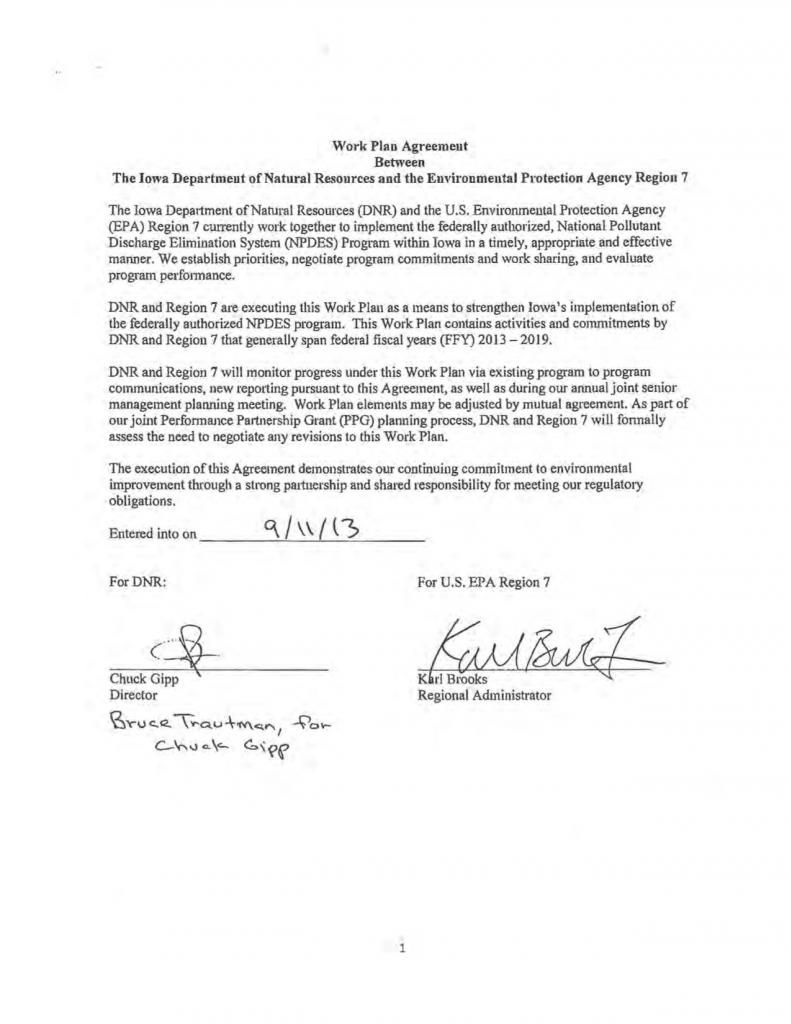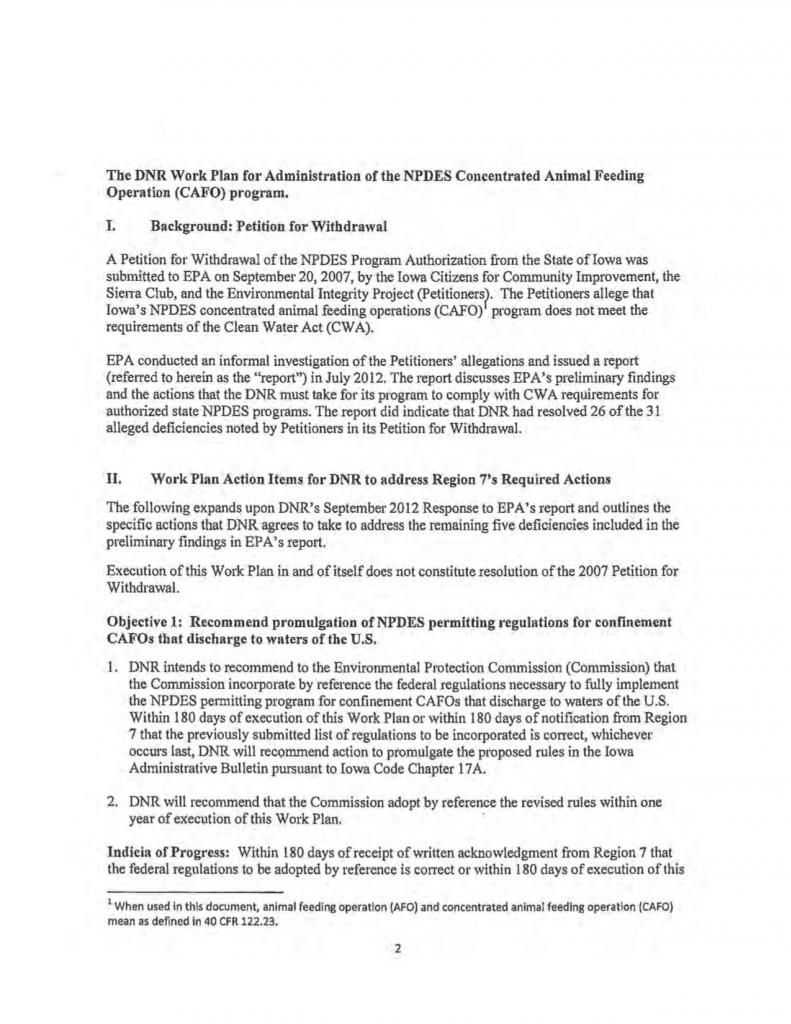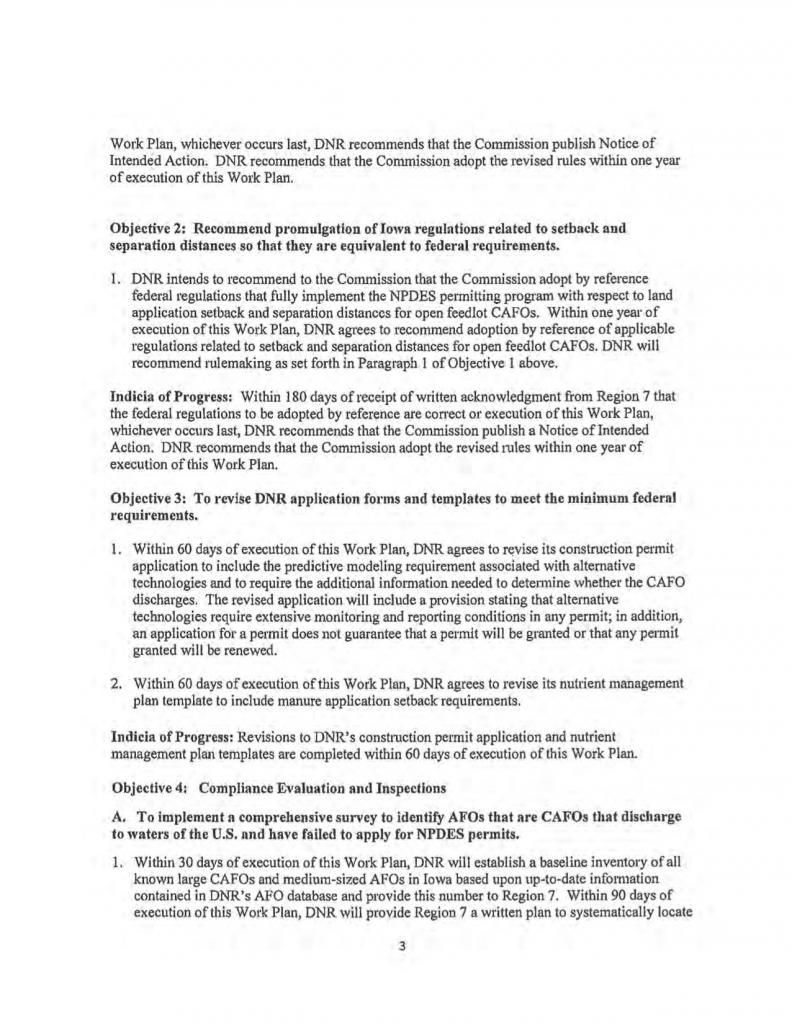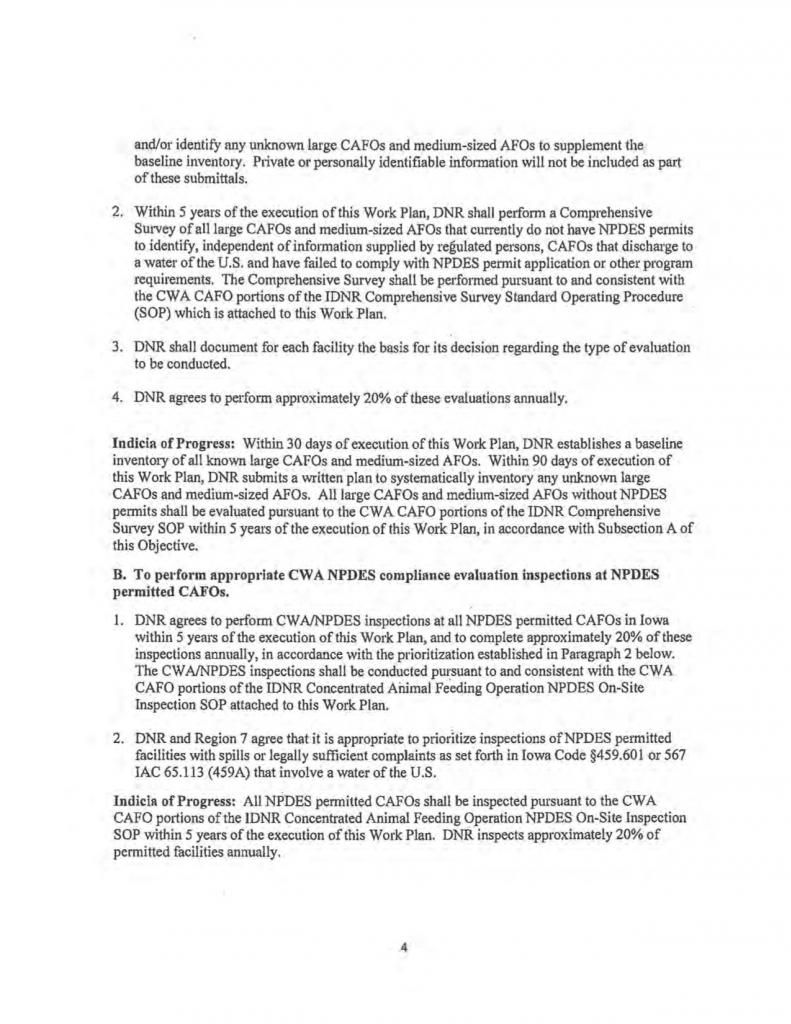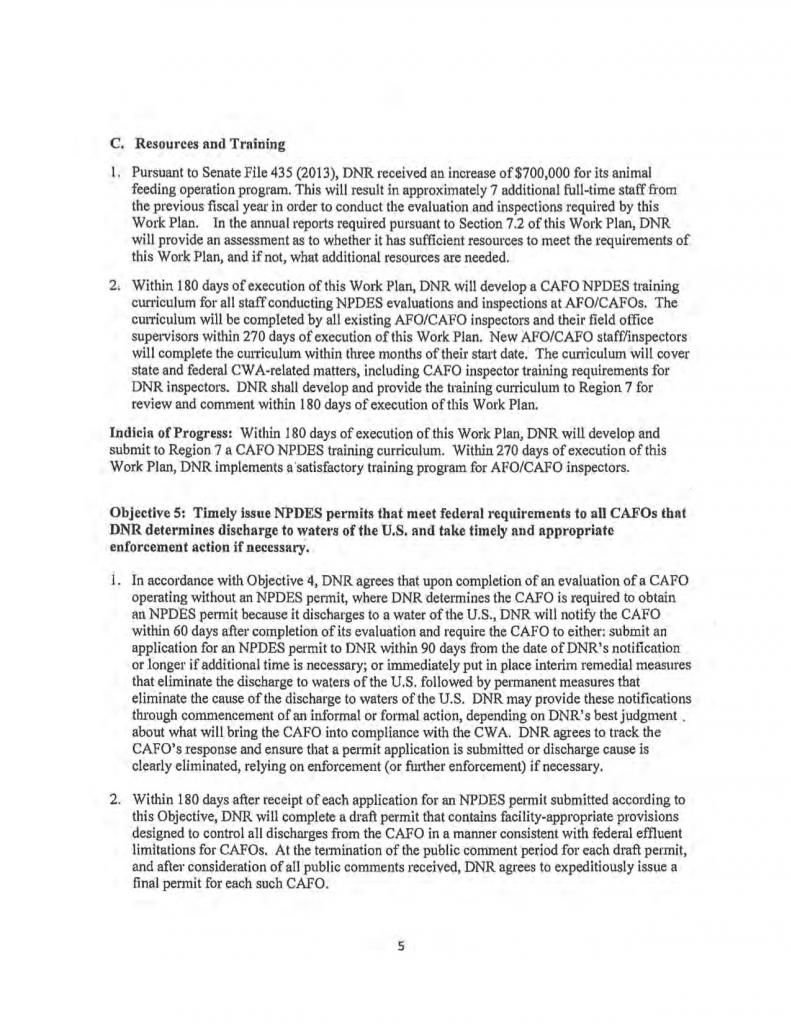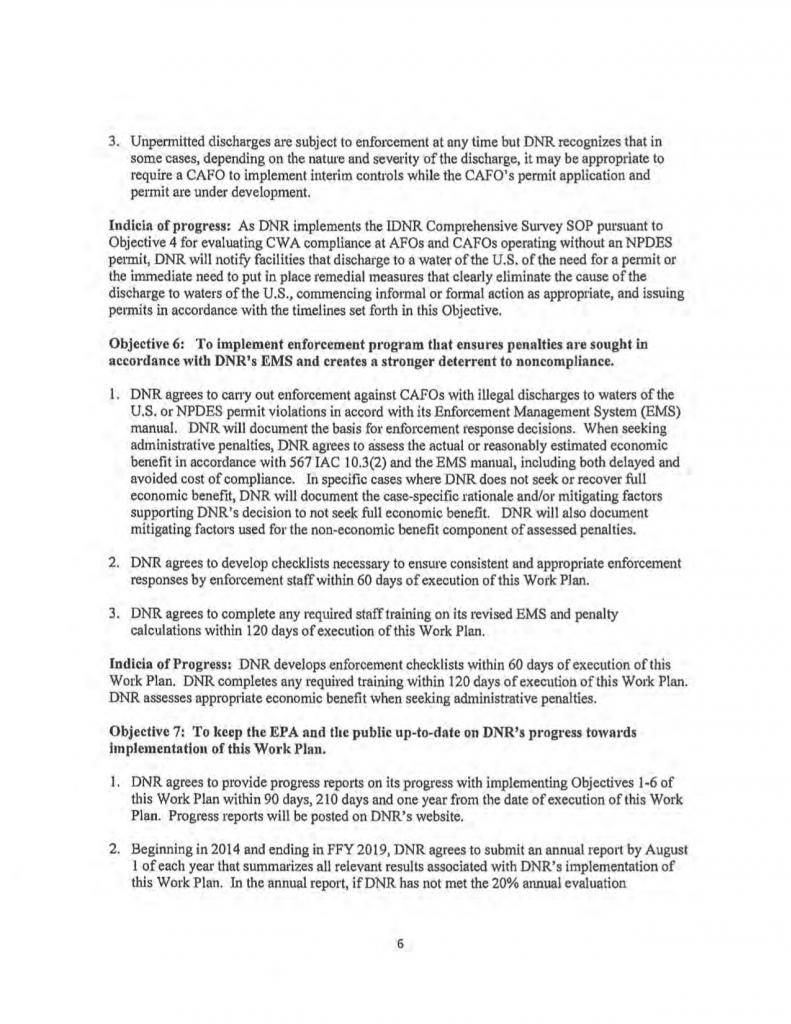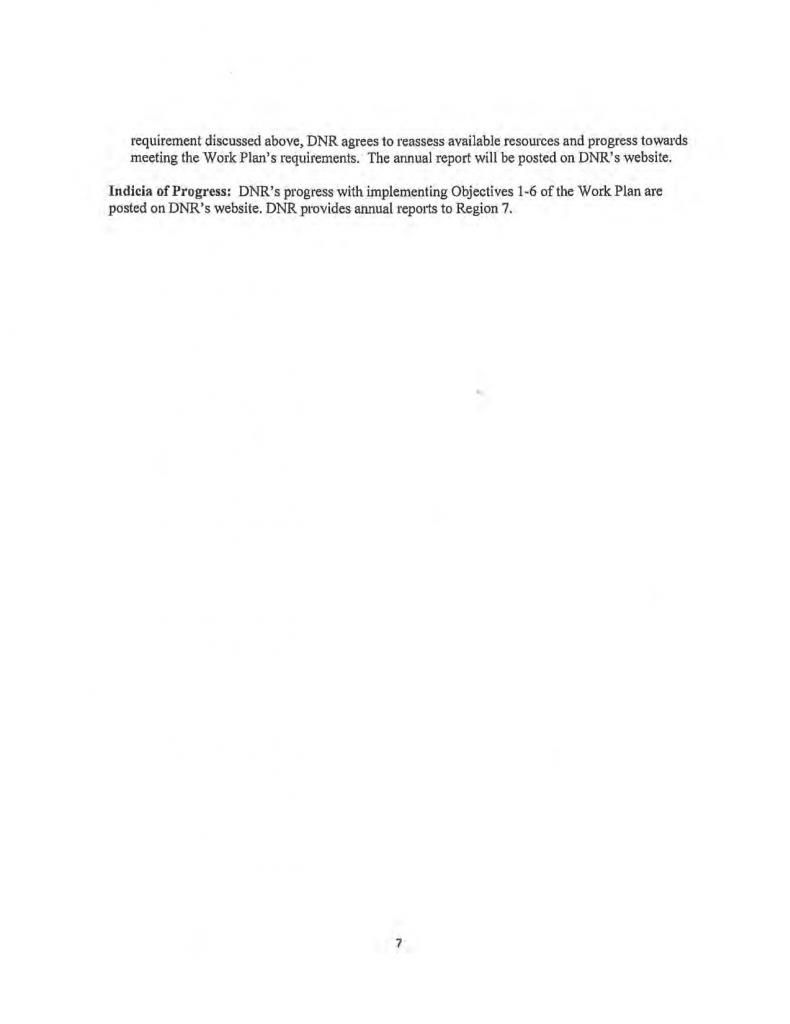Some potentially good news for Iowa waterways: after months of delays, the Iowa Department of Natural Resources and the U.S. Environmental Protection Agency finally signed a work plan on new procedures for permitting and inspecting large livestock farms.
Iowa’s confined animal feeding operations create more untreated manure annually than the total sewage output of the U.S. population. An EPA report published last summer concluded that the DNR’s CAFO permitting and inspection protocols did not conform to the Clean Water Act.
Federal and state officials negotiated a draft work plan to address these problems last fall, and the plan was ready to be signed in January of this year. However, the DNR requested changes to the plan based on feedback from the Iowa Farm Bureau, which tries to protect corporate agriculture from effective public oversight. Governor Terry Branstad tried to intervene with EPA officials to reduce inspections of factory farms. (Click here to read the correspondence.) To the dismay of some environmentalists, the governor also insisted that EPA Administrator Gina McCarthy meet with industry representatives to discuss the CAFO inspection regime.
Although the final work plan isn’t ideal and provides for fewer in-person inspections than the earlier draft, the agreement looks like a big improvement on the status quo at the DNR. After the jump I’ve posted statements on today’s news from the DNR and environmental organizations that have been involved with this process. I also posted the seven-page work plan for inspecting thousands of CAFOs over the next five years. For more background, check out the EPA Region 7’s website and the Sierra Club Iowa chapter’s documents on CAFOs.
It will take a lot of follow through to make sure the DNR implements this plan. The agency indicated last fall that it would need thirteen new livestock inspector positions to meet Clean Water Act goals. Then DNR Director Chuck Gipp formally asked for eleven new positions in the 2014 budget, but Governor Branstad requested funding for only five new inspectors. Iowa Senate Democrats approved funding for thirteen new inspectors, but Iowa House Republicans supported the governor, and final budget for fiscal year 2014 included funding for just seven new DNR positions in this area.
Iowa Department of Natural Resources press release, September 11:
STATE OF IOWA AND EPA REACH AGREEMENT ON PARTNERSHIP APPROACH AND NPDES PROGRAM CLARIFICATIONS
DES MOINES – A work plan agreement on the National Pollutant Discharge Elimination System (NPDES) Program, a federal program under the Clean Water Act, has been reached by the Iowa Department of Natural Resources (DNR) and the Environmental Protection Agency (EPA).
The agreement, signed today, by Iowa Department of Natural Resources and EPA Region 7, establishes a partnership approach for working with large and medium scale livestock operations in Iowa to share best practices, clarify responsibilities, and further demonstrate the shared commitment from all stakeholders to be good stewards of the land. This work plan agreement will help to clarify misunderstandings about the NPDES program implementation and underscore our shared interest in environmental preservation and protection.
“Our state is blessed with many natural resources and we want to continue our efforts to protect our land and water for future generations.” said DNR Director Chuck Gipp, “As we gathered suggestions for this work plan, we visited with many Iowans affected by the NPDES program, including farmers, landowners, municipalities, the EPA and other stakeholders to discuss how we can work together to achieve a shared goal. This work plan agreement clarifies program implementation and is a reflection of Iowans working together on a commonsense solution that will encourage best practices and promote open communication between affected Iowans and the DNR.”
“This plan rejects a one-size-fits-all approach for every farm in Iowa. Instead, the state chose a partnership approach that enables agricultural producers to leverage best practices proactively,” said Bruce Trautman, Deputy Director of the DNR.
In addition to the work plan agreement, DNR also worked with the EPA and affected stakeholders to create a variety of standard operating procedure documents, which will promote best practices, embrace the partnership approach and provide for further regulatory certainty for Iowa farmers and landowners.
“We also believe this partnership approach will improve stakeholder coordination and allow us to better focus resources,” Gipp added.
Gipp said U.S. EPA Administrator Gina McCarthy’s visit to Iowa during the State Fair helped the process of completing a final work plan.
“I think Administrator McCarthy’s message of cooperation rather than confrontation was well received here in Iowa,” said Gipp.
This work plan is just another demonstration of the State of Iowa’s commitment to water quality. Earlier this summer Governor Branstad signed into law a $700,000 appropriation to hire seven additional environmental specialists and $22.4 million appropriated to the Iowa Department of Agriculture and Land Stewardship for water quality initiatives, including the Nutrient Reduction Strategy. In addition, DNR received an additional $8.6 million for lake restoration.
A copy of the final work plan agreement can be found at www.epa.gov/region7/water
Iowa Citizens for Community Improvement press release, September 11:
Today’s the day we’ve all been working and waiting for. Because of the work of you and thousands of Iowans, we’ve got a victory.
Environmental Protection Agency and the Iowa Department of Natural Resources have signed a far-reaching Clean Water Act work plan agreement that will significantly change the way the state of Iowa enforces, inspects, and permits factory farms.
You can read the final agreement and all related documents and materials on the EPA Region 7 website here: http://www.epa.gov/region7/water/ .This is a huge victory for clean water in Iowa. The workplan mandates:
• on-site inspections for all large factory farms
• on-site inspections for medium-sized factory farms if they have had a sizeable spill in the last five years, or store manure in an open pit less than 1/4 mile from a water of the U.S.
• desk surveys for all other medium-sized factory farms
increased separation distances• tougher enforcement, including more violations subject to fines and penalties
The work plan process was initiated by the EPA in response to a 2007 de-delegation petition filed by Iowa Citizens for Community Improvement, the Environmental Integrity Project, and the Iowa Sierra Club. The petition called on EPA to strip the Iowa DNR of its regulatory authority under the Clean Water Act for its failure to enforce federal law against factory farm polluters. The petition will remain outstanding during the five-year implementation period.
Iowa Governor Branstad and industry groups pushed for a much weaker agreement that would have only guaranteed on-site inspections for about 500 of the very largest factory farms – those with more than 2,000 beef cattle or 5,000 hogs – but the final agreement requires inspections at at least 3,200 facilities after the petitioners and 17 other organizations demanded on-site inspections for all medium-sized and large factory farms.
The thousands of inspections and assessments DNR must conduct under the new agreement are intended to identify discharging facilities that require Clean Water Act permits.Iowa CCI member Larry Ginter says it best:
“There’s no question this deal would have been stronger and more effective without the political interference of Governor Branstad and the Iowa Farm Bureau, but at the end of the day, this is a good step forward that lays the groundwork to win even more changes in the future. This fight is far from over. We will rigorously monitor the implementation of this agreement and continue to press our demands through rulemaking as well as during the 2014 legislative session.”
Environmental Integrity Project press release, September 11:
Long-awaited Factory Farm Pollution Work Plan a Good Step Forward despite Political Interference
Signed DNR-EPA agreement requires on-site inspections for all large factory farms, tougher enforcement standards, and new rules for Clean Water Act permits
September 11, 2013
DES MOINES, IA ///September 11, 2013///The U.S. Environmental Protection Agency (EPA) and the Iowa Department of Natural Resources (DNR) have signed a far-reaching Clean Water Act work plan agreement that will significantly change the way the state inspects, permits, and takes enforcement actions against factory farms. Significant work plan requirements include:• On-site inspections for all “large” factory farms (more than 1,000 beef cattle or 2,500 hogs) – about 3,200 facilities meet the federal definition of a large factory farm in the state of Iowa, according to DNR records;
• On-site inspections for some “medium” factory farms (300 – 999 beef cattle or 750-2,499 hogs), if they pose a high risk of water pollution due to recent discharges or exposed manure lagoons in close proximity to waterways;
• Desktop evaluations for all other medium-sized factory farms – about 4,800 facilities in Iowa meet the federal definition of a medium-sized factory farm, according to DNR records;
• New factory farm permit regulations within one year – to bring Iowa’s permit rules into compliance with the Clean Water Act;
• Strengthen manure application setback requirements within one year – by establishing new separation distances that meet federal law; and
• Tougher enforcement protocols that broaden the universe of factory farm violations subject to fines and penalties.
The work plan process was initiated by the EPA in response to a 2007 de-delegation petition filed by Iowa Citizens for Community Improvement, the Environmental Integrity Project, and the Iowa Sierra Club. The petition called on EPA to strip the Iowa DNR of its regulatory authority under the Clean Water Act for its failure to enforce federal law against factory farm polluters.
This joint press release contained some additional information and background:
Long-Awaited Factory Farm Pollution Work Plan a Good First Step Forward Despite Branstad’s Political Interference
Signed DNR/EPA agreement requires on-site inspections for all large factory farms, tougher enforcement standards, and new rules for Clean Water Act permits
Des Moines, Iowa –
The U.S. Environmental Protection Agency (EPA) and the Iowa Department of Natural Resources (DNR) have signed a far-reaching Clean Water Act work plan agreement that will significantly change the way the state inspects, permits, and takes enforcement actions against factory farms. You can read the final agreement and all related documents and materials on the EPA Region 7 website here: http://www.epa.gov/region7/water/
Significant work plan requirements include:
· On-site inspections for all “large” factory farms (more than 1,000 beef cattle or 2,500 hogs) – about 3,200 facilities meet the federal definition of a large factory farm in the state of Iowa, according to DNR records;
· On-site inspections for some “medium” factory farms (300 – 999 beef cattle or 750-2,499 hogs), if they pose a high risk of water pollution due to recent discharges or exposed manure lagoons in close proximity to waterways;
· Desktop evaluations for all other medium-sized factory farms – about 4,800 facilities in Iowa meet the federal definition of a medium-sized factory farm, according to DNR records;
· New factory farm permit regulations within one year – to bring Iowa’s permit rules into compliance with the Clean Water Act;
· Strengthen manure application setback requirements within one year – by establishing new separation distances that meet federal law; and
· Tougher enforcement protocols that broaden the universe of factory farm violations subject to fines and penalties.
The work plan process was initiated by the EPA in response to a 2007 de-delegation petition filed by Iowa Citizens for Community Improvement, the Environmental Integrity Project, and the Iowa Sierra Club. The petition called on EPA to strip the Iowa DNR of its regulatory authority under the Clean Water Act for its failure to enforce federal law against factory farm polluters. The petition will remain outstanding during the five-year implementation period.
Iowa Governor Branstad and industry groups pushed for a much weaker agreement that would have only guaranteed on-site inspections for about 500 of the very largest factory farms – those with more than 2,000 beef cattle or 5,000 hogs – but the final agreement requires inspections at at least 3,200 facilities after the petitioners and 17 other organizations demanded on-site inspections for all medium-sized and large factory farms.
The thousands of inspections and assessments DNR must conduct under the new agreement are intended to identify discharging facilities that require Clean Water Act permits. DNR must complete 20 percent of the total inspections each year. The work plan agreement also requires DNR to submit a status report in 90 days, 210 days, and annually thereafter. DNR will file annual reports on its work plan progress, and EPA will continue to assess whether the state is moving towards compliance with the Clean Water Act. The status reports will be published on DNR’s website.
Representatives of the community-environmental coalition whose petition drove the process for the DNR/EPA agreement hailed the agreement as a significant step towards clean water, but cautioned that they will measure success in the number of Clean Water Act permits DNR actually issues to documented polluters, the strength of enforcement actions against violators going forward, and the change in quality of the Iowa’s rivers, lakes and streams.
Iowa CCI member Larry Ginter, an independent family farmer from Rhodes, Iowa, said:
“There’s no question this deal would have been stronger and more effective without the political interference of Governor Branstad and the Iowa Farm Bureau, but at the end of the day, this is a good step forward that lays the groundwork to win even more changes in the future. This fight is far from over. We will rigorously monitor the implementation of this agreement and continue to press our demands through rulemaking as well as during the 2014 legislative session.”
Iowa Sierra Club legal counsel Wally Taylor of Cedar Rapids said:
“The signed work plan creates a framework that could require corporate confinements to finally get discharge permits, and we hope it will be implemented in a way that effectively penalizes factory farms for polluting our water.”
Environmental Integrity Project legal counsel Tarah Heinzen said:
“This agreement is the critical first step we have been waiting for since EPA found over a year ago that Iowa’s factory farm program is failing. Strong continued oversight by EPA will be essential to ensuring Iowa adequately inspects and permits polluting facilities that have been let off the hook for years.”
The Iowa DNR and U.S. EPA have been negotiating a work plan agreement to bring the state of Iowa into compliance with the Clean Water Act since EPA released a scathing report in July 2012 finding the DNR’s factory farm program does not meet federal Clean Water Act requirements. The 2012 investigation report found that DNR:
Has failed to issue permits to factory farms when required,
Does not have an adequate factory farm inspection program,
Frequently fails to act in response to manure spills and other environmental violations,
Does not assess adequate fines and penalties when violations occur.
Iowa’s water quality has never been worse than now, with 628 polluted bodies of water, and manure and other fertilizer runoff so high that Des Moines Water Works ran the world’s most expensive nitrate removal system for nearly 90 days this spring and summer, costing 500,000 ratepayers in Central Iowa nearly $900,000.Iowa CCI is a statewide people’s action group that uses community organizing to build grassroots power and win public policy that puts communities before corporations and people before profits, politics, and polluters.
Iowa Citizens for Community Improvement is a group of everyday people who talk, act and get things done on issues that matter most. With thousands of members from all walks of life — urban and rural, black and white, immigrants and lifelong Iowans — CCI has been tackling tough issues and getting things done for more than 38 years.
For more information about Iowa Citizens for Community Improvement, visit www.iowacci.org
ADDITIONAL INFORMATION ABOUT THE GROUPS
The Environmental Integrity Project (http://www.environmentalintegrity.org) is a nonpartisan, nonprofit organization established in March of 2002 by former EPA enforcement attorneys to advocate for effective enforcement of environmental laws. EIP has three goals: 1) to provide objective analyses of how the failure to enforce or implement environmental laws increases pollution and affects public health; 2) to hold federal and state agencies, as well as individual corporations, accountable for failing to enforce or comply with environmental laws; and 3) to help local communities obtain the protection of environmental laws.
Iowa Citizens for Community Improvement (http://www.iowacci.org) is a 37-year-old statewide non-profit grassroots organization. Iowa CCI has led the fight against factory farms in Iowa for the past 15 years and has pushed for better environmental and permitting laws for factory farms on the state and national level.
Sierra Club is the nation’s oldest grassroots environmental organization. Its 1.4 million members and supporters work together to protect our communities and the planet. Through litigation and administrative and legislative advocacy, the Sierra Club has worked for the past decade to improve controls over factory farm water and air pollution.
UPDATE: In a September 12 press release, Iowa Citizens for Community Improvement called attention to some potential loopholes in this deal:
Success of Deal Will Ultimately Be Measured In The Number of New Operating Permits Actually Issued to Factory Farm Polluters
Iowa CCI members caution that Governor Branstad and the Iowa DNR cannot be trusted to implement work plan deal on their own
Des Moines, Iowa –
As all sides position themselves to claim credit for a far-reaching Clean Water Act work plan deal that, in reality, the state of Iowa was pressured into signing yesterday, Iowa Citizens for Community Improvement (Iowa CCI) members caution that the best deal on paper won’t mean much if the Iowa Department of Natural Resources (DNR) doesn’t properly implement the factory farm pollution accord over the next five years.
The deal reached between the Iowa DNR and the U.S. Environmental Protection Agency yesterday requires DNR field staff to perform comprehensive reviews of the 8,000 largest factory farms in Iowa – including on-site, boots-on-the-ground inspections for thousands of facilities.
“The deal is good on paper but if the DNR thinks they can just walk into these inspections with their blindfolds on, then we’re headed for a pretty bumpy ride,” said Barb Kalbach, a fourth-generation family farmer and CCI member from Dexter, Iowa.
“At the end of the day, the success of this deal will be judged solely by the number of Clean Water Act operating permits actually issued to factory farm polluters.”
The thousands of inspections and assessments DNR must conduct under the new agreement are intended to identify discharging facilities that require Clean Water Act permits. DNR must complete 20 percent of the total inspections each year. The work plan agreement also requires DNR to submit a status report in 90 days, 210 days, and annually thereafter. DNR will file annual reports on its work plan progress, and EPA will continue to assess whether the state is moving towards compliance with the Clean Water Act.
Iowa CCI members say one loophole the DNR worked into the final agreement is a provision governing inspections that states the DNR may not have to perform on-site reviews of some large factory farms if an equivalent inspection has been completed since November 1 of 2011.
CCI members say it isn’t possible that any inspections since 2011 could possibly be adequate because a July 2012 report by EPA specifically found the DNR’s inspection program wasn’t up to par, and because the new inspection procedures were just finalized yesterday so the DNR has never been trained to conduct an inspection using the new criteria before.
“Any DNR Director under Governor Branstad’s leadership will continue to try and get out of as many of their obligations as they can unless the public continues to hold them accountable to the strongest possible interpretation of the law,” Kalbach said.
A second questionable provision in the work plan is language stating that medium-sized factory farms that have “had a significant release within the last 5 years, and the release presented a substantial threat of discharging pollutants to a water of the U.S.” will be bumped up in priority from a desktop assessment to an on-site inspection. The problem, according to CCI members, is that there is no clear definition about what a “significant release” presenting a “substantial threat” to a waterway actually is.
“We have numerous examples of manure spills and other violations that posed extremely dangerous threats to our water quality which the DNR refused to take seriously based on their lack of enforcement,” Kalbach said.
Iowa CCI members also say they will continue to fight for more inspections and stronger permits – including a “three strikes and you’re out” policy – during an upcoming rulemaking process mandated by the final work plan agreement as well as during the 2014 legislative session beginning in January.
Iowa’s water quality has never been worse than now, with 628 polluted bodies of water, and manure and other fertilizer runoff so high that Des Moines Water Works ran the world’s most expensive nitrate removal system for nearly 90 days this spring and summer, costing 500,000 ratepayers in Central Iowa nearly $900,000.
There have been more than 800 documented manure spill since 1995, according to DNR records.
Iowa CCI is a statewide people’s action group that uses community organizing to build grassroots power and win public policy that puts communities before corporations and people before profits, politics, and polluters.

